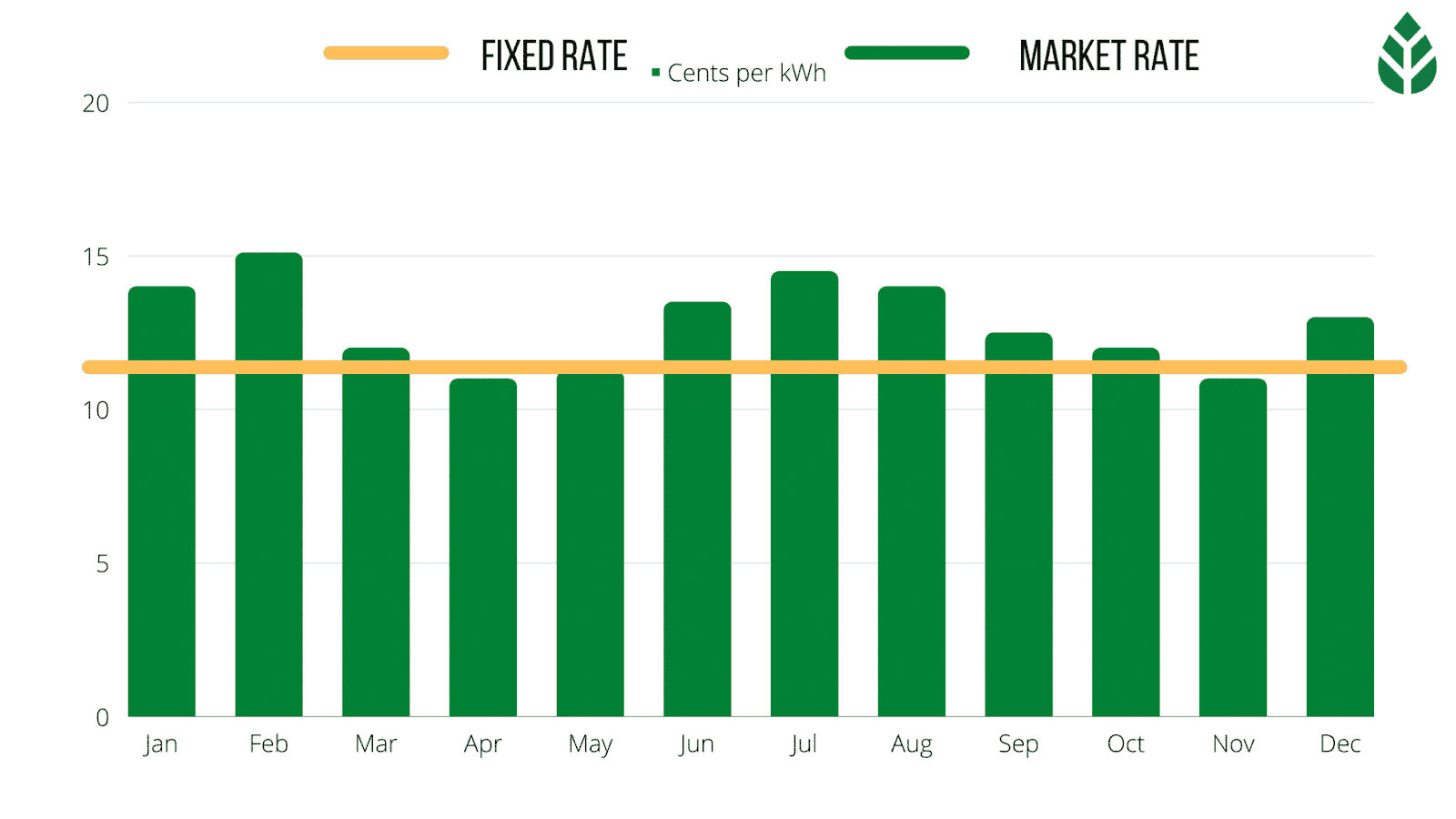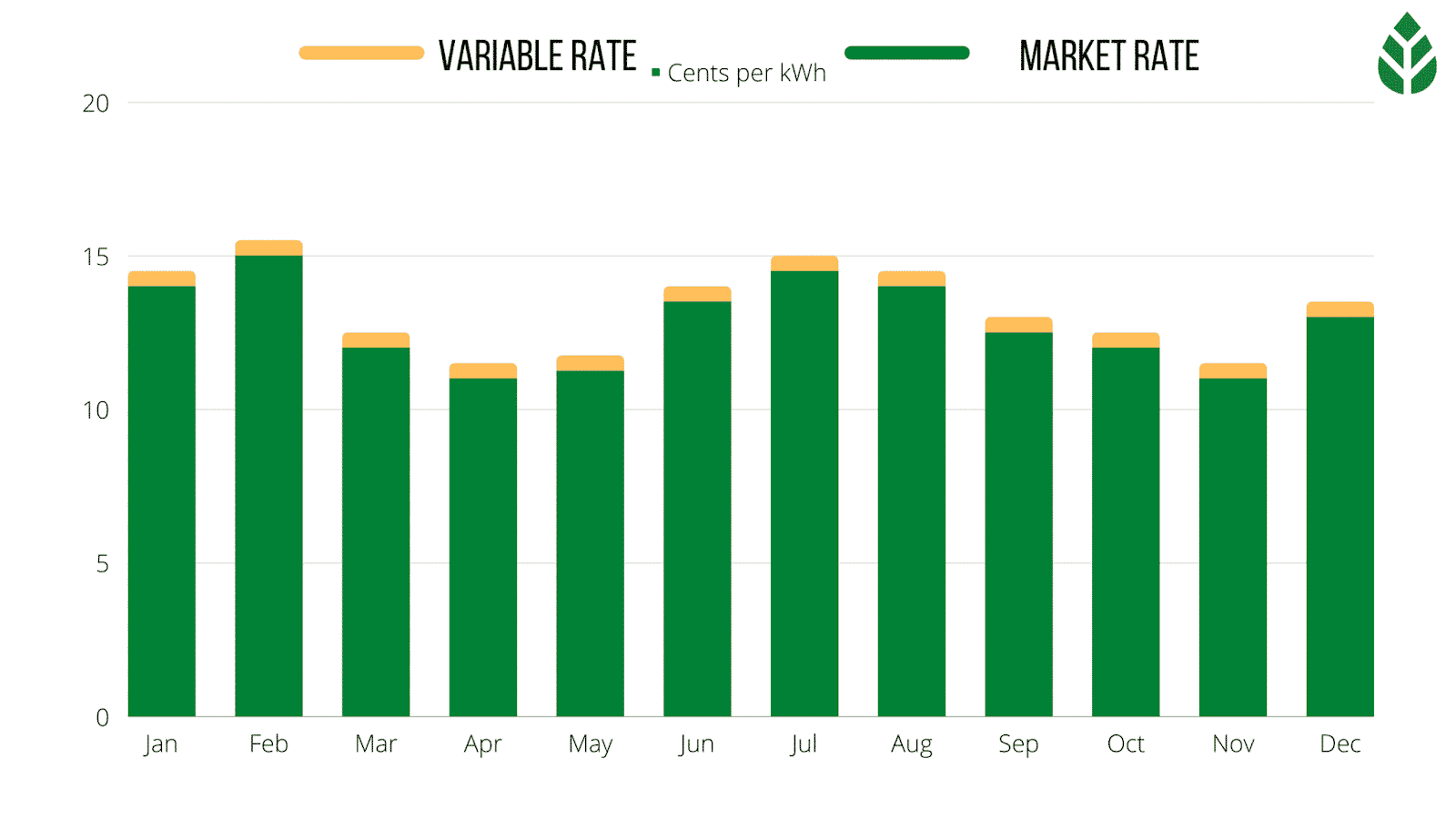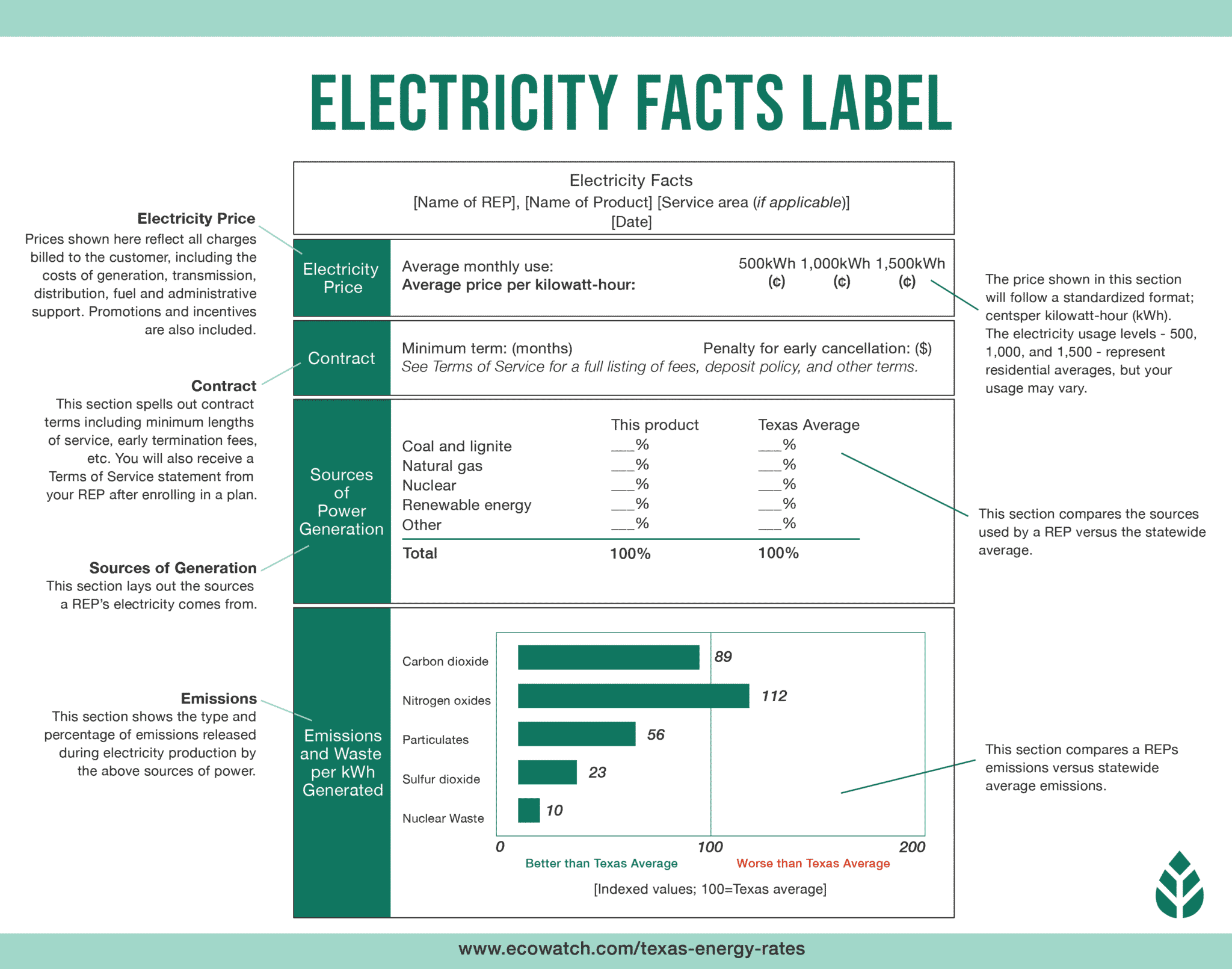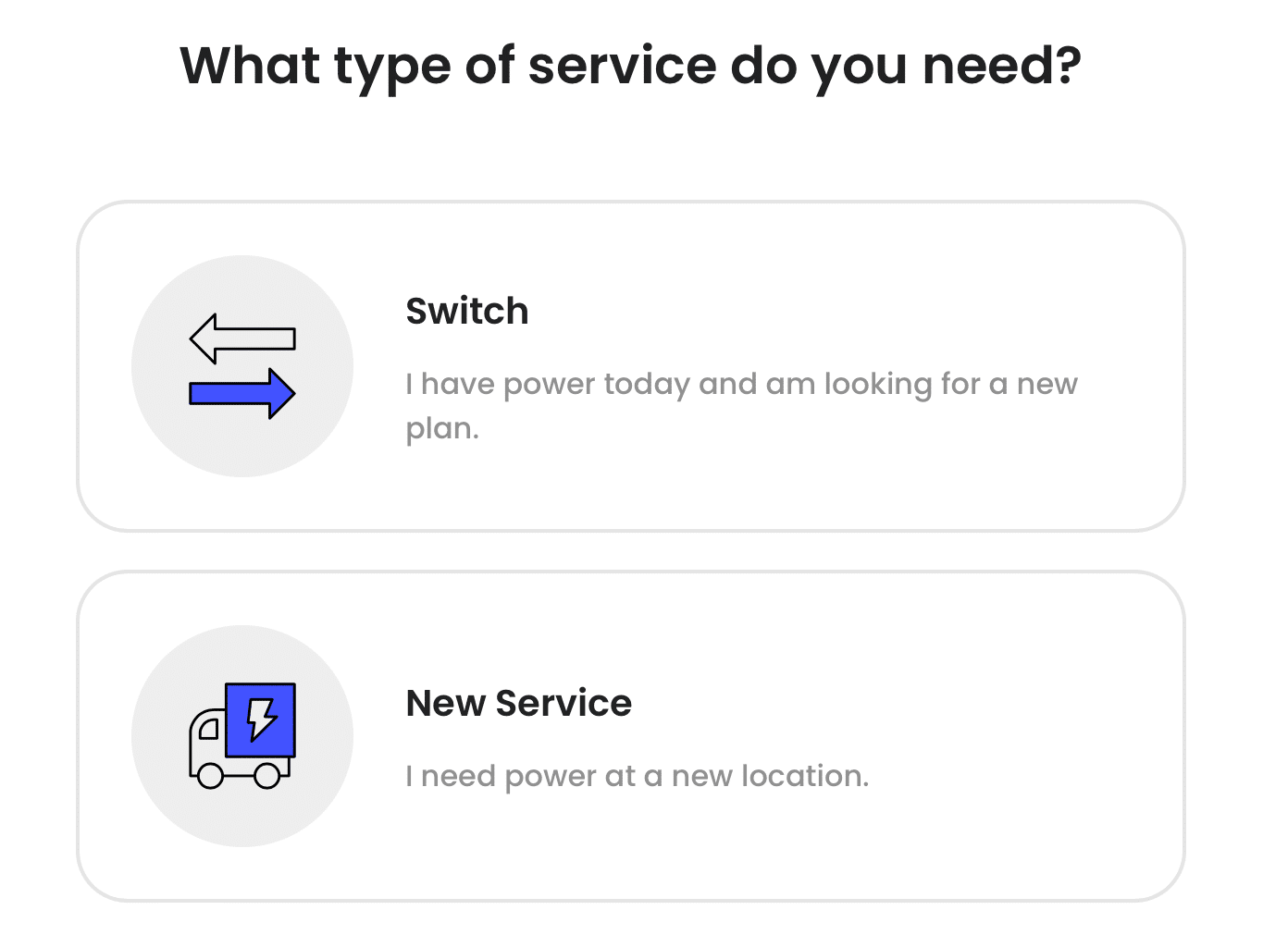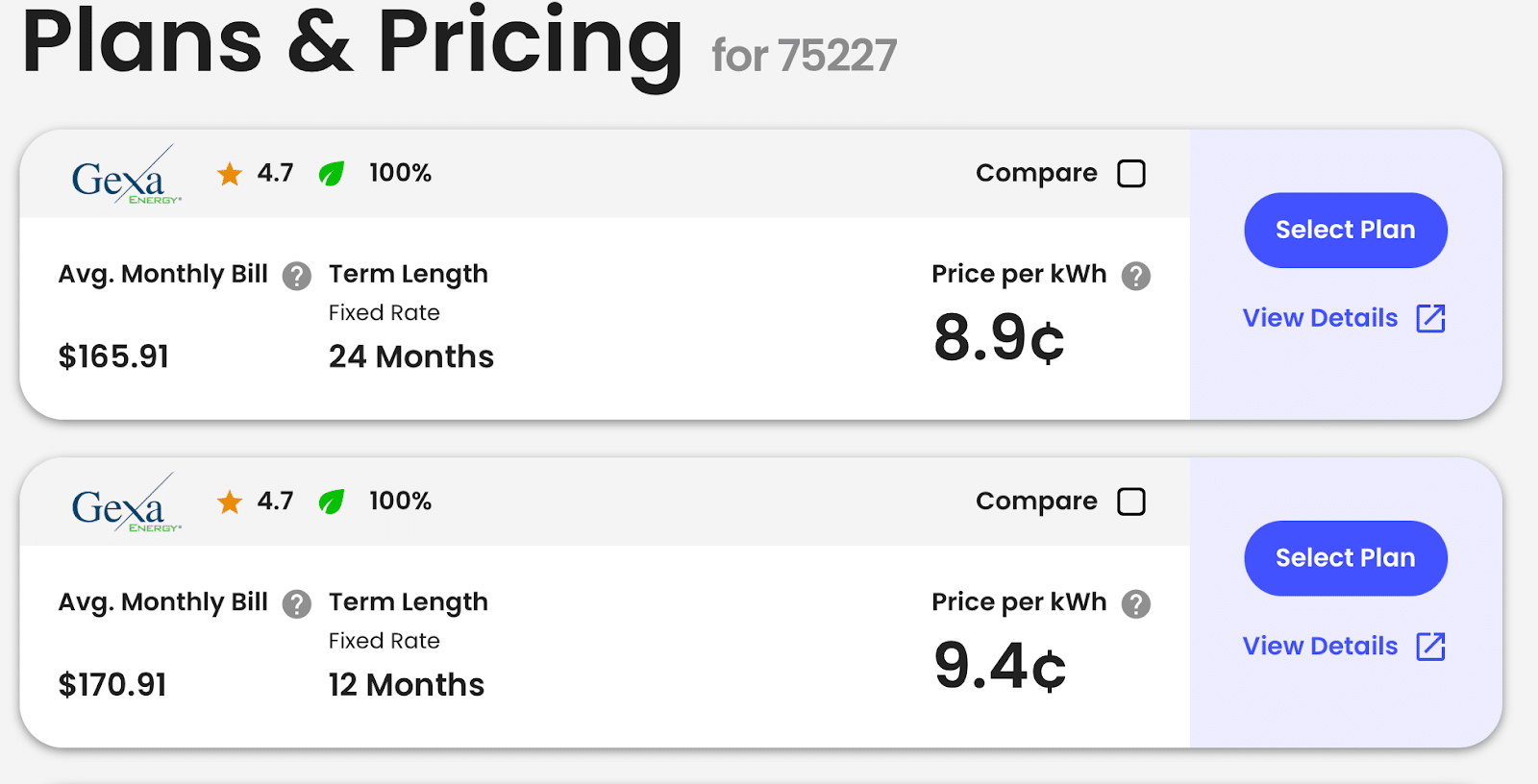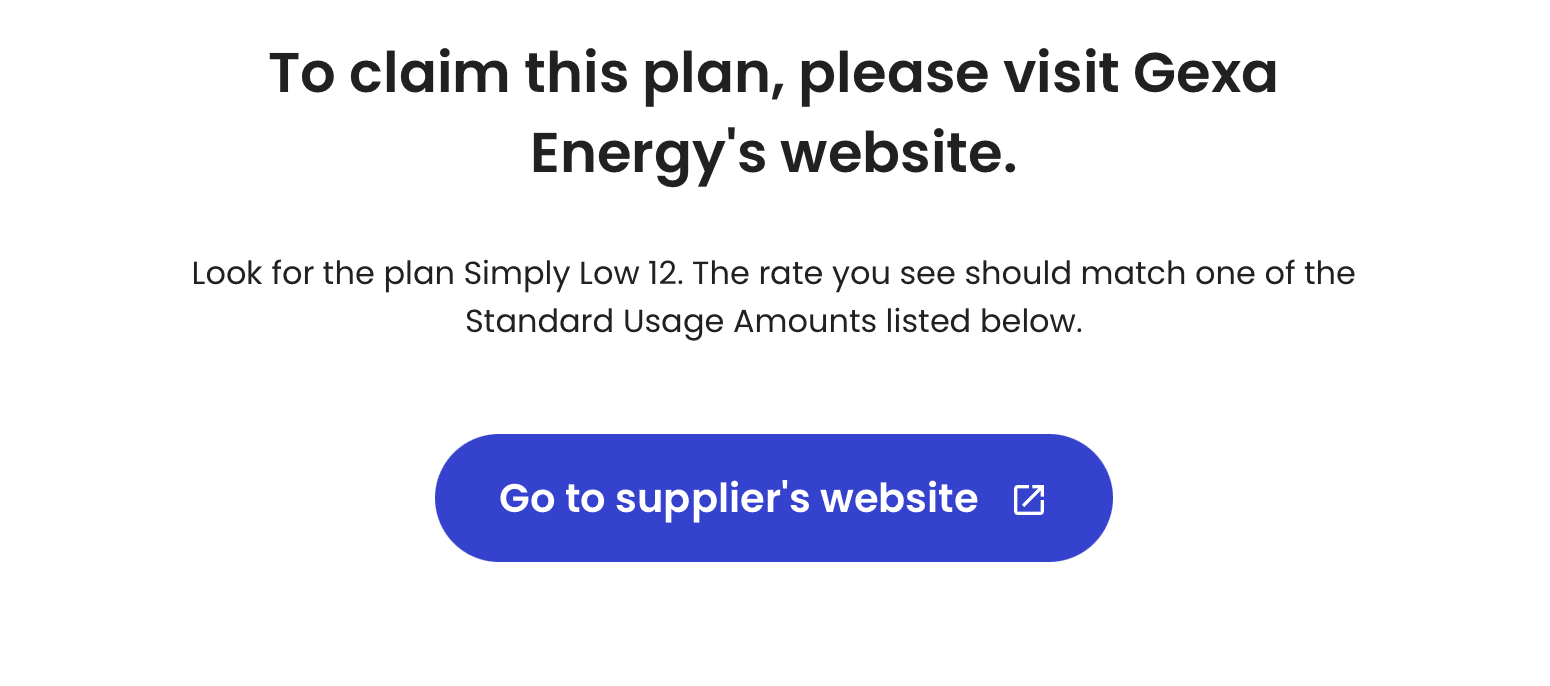

Houston Electricity Rates and Plans (May 2024)
- Average Houston electricity rates: 15.88 cents per kWh
- Average monthly electric bill: $206.44, based on average usage of 1,300 kWh
Each product and or company featured here has been independently selected by the writer. You can learn more about our review methodology here. If you make a purchase using the links included, we may earn commission.
Here at EcoWatch, we strive for a more sustainable planet and encourage our readers to do their part when feasible. As such, we’ve chosen to highlight some of the best electric companies in Houston that offer 100% renewable energy. The cheapest Houston electricity plan is the Gexa Eco Choice 3 plan from Gexa Energy, with a per-kWh rate of just 8.9 cents. Most impressive is that this plan uses 100% renewable energy but still maintains the overall most affordable electricity rate in Houston. The chart below shows renewable energy plans and prices available throughout the Houston area.
PROVIDER |
PLAN NAME |
RATE (¢/kWh) (1,000 kWh plans)* |
LENGTH (months) |
|
Gexa Energy |
Gexa Eco Choice 3 |
8.9 |
3 |
|
Rhythm Energy |
Simply Choose 3 |
9.1 |
3 |
|
Rhythm Energy |
Power to Shift 3 |
9.1 |
3 |
|
Chariot Energy |
Chariot Choice 3 |
10.1 |
3 |
|
Rhythm Energy |
Simply Choose 4 |
10.7 |
4 |
|
Rhythm Energy |
Power to Shift 4 |
10.9 |
4 |
|
Gexa Energy |
Gexa Eco Choice 12 |
12.5 |
12 |
|
Octopus Energy |
Octo 12 with EV |
12.6 |
12 |
|
Octopus Energy |
Octo 12 with Smart Thermostat Connected |
12.6 |
12 |
|
Gexa Energy |
Gexa Eco Choice 24 |
12.8 |
24 |
|
CleanSky Energy |
Embrace Green 36 |
13.2 |
36 |
|
Rhythm Energy |
Power to Shift 12 |
13.6 |
12 |
|
CleanSky Energy |
Embrace Green 12 |
13.6 |
12 |
|
CleanSky Energy |
Embrace Green 24 |
13.7 |
24 |
|
Chariot Energy |
Chariot Choice 15 |
13.8 |
15 |
|
Shell Energy |
Shell Energy Fixed 100% Renewable Plan 36 |
13.8 |
36 |
|
PowerNext |
Fixed Renewable PT |
13.8 |
36 |
|
Chariot Energy |
Chariot Choice 36 |
13.8 |
36 |
|
PowerNext |
Fixed Renewable PT |
14.2 |
12 |
|
Gexa Energy |
Gexa Guarantee 12+ |
14.2 |
12 |
*Rates will vary based on your TDU. You’ll see the above rates if your TDU is CenterPoint Energy. These rates include the utility’s current charge of $0.04 cents per kWh. Rates are according to Texas’ Public Utilities Commission and are subject to change.1
On average, a clean energy plan might cost around 1 cent per kWh more than a non-renewable energy plan. If you use 1,000 kWh per month, that will be about a $10-$15 difference.
How to Choose the Best Electricity Plan in Houston
When searching for the best electricity rates in Houston, keep in mind that rates and the average cost of electricity can vary based on numerous factors. That means you may be given a different electric rate than that of your next-door neighbors. Here are a few things that factor into the cost of electricity in Houston:
Types of Electricity Plans
When choosing an energy provider in Houston, you’ll be presented with a few different types of plans. Here’s an overview of the different options offered by most companies in Houston, as well as their pros and cons, so you can pick the best plan for you.
PLAN TYPE |
PROS |
CONS |
|
Fixed-Rate Energy Plans |
|
|
|
Variable-Rate Energy Plans |
If the price of energy drops, there may be some months where a variable-rate electric customer will be paying less per kWh than someone on a fixed-rate plan. |
Variable rates can be very risky given the extreme weather or other factors that can suddenly — and drastically — increase the price of electricity. |
|
Green Energy Plans |
|
|
Fixed-Rate vs Variable-Rate Plans
Just as it sounds, a fixed-rate plan allows you to secure a rate that will stay the same throughout the entire duration of your contract. Note that “fixed rate” does not mean your electric bill will stay exactly the same month over month. Rather, the rate you pay per kilowatt-hour will be fixed. So, your overall bills will still be higher during the months you use more electricity.
If you prefer paying month-to-month instead of being locked into a long-term contract, you may consider a variable-rate electric plan. As implied by the name, variable-rate plan prices are based on variables in the energy market. The price per kWh will increase or decrease depending on supply and demand. We saw the biggest negative impact of variable-rate plans during the February 2021 winter storm, when millions were in the dark due to a massive power outage. Texans who kept their lights on paid the price, with at least one customer facing an electric bill over $16,700.2 Texas power companies were reportedly overcharged $16 billion dollars by the electric grid operator.
Green Energy Plans
Green energy plans are those that supply electricity from renewable energy sources. Those sources will primarily be wind and solar energy in Texas.8
Some REPs may have Green-e Verification or a similar certification to ensure that the electricity is responsibly generated, transmitted and distributed. Non-green energy plans, at least in Texas, rarely meet 25% of their total energy from renewable sources.3 Most green energy REPs will still offer variable- and fixed-rate electricity plans — the main difference is where the energy comes from.
Your Energy Usage
The amount of electricity your household consumes may affect the rate you pay per kWh. Most REPs offer tiered plans based on average energy usage. Tiered-rate energy plans are often called “V-shaped plans” because the rates are more expensive for people who use the least and most amounts of energy and are lowest for those in the middle.
For example, in a typical tiered plan, customers who use around 500 kWh or 2,000 kWh per month will pay more than those who use around 1,000 kWh per month. Data from the Electric Reliability Council of Texas (ERCOT) shows the average home in the Houston area uses 1,300 kWh per month.4
Contract Length
The length of a contract will also play a factor in the cost of your electricity. As with most services, the longer you commit to one provider, the better deal you’ll get. We’ll discuss the different types of electricity plans in the next section.
A word of caution: Read the fine print and ask questions before you sign anything. Many contracts come with startup fees as well as charges for breaking a contract. And while some companies may advertise a $10 cancellation fee, the fine print could read that it’s actually $10 per month left on the contract.
Electricity Facts Label
When shopping for an energy provider, always ask for an Electricity Facts Label (EFL). Similar to a nutrition label you see on packaged foods, an EFL will give you all of the information about a company’s electricity prices, contract lengths and terms, sources of generation, and emission levels.5 Here’s an example of what that’ll look like:
If you’re interested in seeing the best energy rates you’re eligible for in Houston, you can start comparing prices and plans here. As a trusted energy information source, EcoWatch is often able to secure discounted rates for our readers.
Watchouts
One thing you should always pay close attention to when choosing an energy plan in Houston is the rate structure. Fixed rates mean you’ll never have any surprises, and your bill will only change based on the amount of electricity you use. Variable rates can change based on consumption but also the market price of electricity. Variable rates often look more appealing because they might be lower upfront, but they can spike without warning if demand goes up. Neither is best for everyone, but make sure you know which you’re signing up for.
You should also pay attention to high early cancellation fees. Many companies have cancellation fees of $75 to $100, but make sure yours isn’t significantly higher. Lastly, you should be aware that most contracts include terms that state you’ll be automatically enrolled in a variable-rate plan after the plan expires. You should schedule out a time to review your plan and choose a new one when the current one expires.
There has also been a history of scam activity in Houston and other areas in Texas where energy is deregulated. Some homeowners have reported scammers who call and demand payment for “past-due bills.” Never provide payment information over the phone unless you call your REP directly using the phone number you find on their website. Other homeowners have reported false representatives going door-to-door to collect payment for energy-saving devices that they say will be delivered but never are. Again, never provide payment information to any door-to-door salesperson.
Understanding Deregulated Energy in Houston
Houston is known as the Energy Capital of the World, hosting a slew of headquarters and intellectual capital for pretty much every segment of the energy industry.7 The city has also had what’s called a “deregulated energy market” since 2002, which allows residents to shop for their own electricity providers.8
As a result, there are well over 100 different Houston electric companies that are competing for your business. These companies, also called retail electricity providers (REPs), offer plans that vary when it comes to contract terms, quality and environmental impact. On top of paying your REP, you’ll be charged an additional fee from your transmission and delivery utility company (TDU) to cover the costs of delivering electricity, meter reading, wiring and more.
If you live in the Houston metropolitan area or any of its surroundings, your TDU is likely CenterPoint Energy.3 CenterPoint’s current rates are about 3.9 cents per kWh of power usage, plus a monthly charge of $4.39. You’ll pay these charges no matter what energy plan or provider you choose, and they’ll be baked into the monthly bill from your provider.
Read Also: What Are the Best Energy Rates in Texas?
What’s the Difference Between Utility Companies and Electricity Provider Companies in Houston?
Utility companies are companies that produce electricity, either by running and maintaining solar or wind farms, or by burning fossil fuels to generate electricity. These are similar to what you might envision when you think of a “power plant.” Utility companies generate the power and maintain the delivery systems, including all electric lines, but they don’t deliver electricity to retail customers.
An electricity provider is an intermediary that buys the electricity from the utility companies and then delivers it to retail customers, like homeowners. They handle billing and customer service, but they aren’t responsible for production or maintaining power lines.
There are some benefits to a deregulated electricity market that makes use of both producers and providers. Since multiple providers compete for your business, it generally drives prices down, provided you shop around for the best deal. It also lets you choose a company based on customer service ratings, renewable energy plans and more, rather than being stuck with a single company.
You can choose your provider in Houston, but electricity production companies (utility companies) are assigned to specific areas, so you can’t make any changes there.
Houston Electricity Rate Trends
Year |
Average Retail Electricity Price (per kWh) |
|
2014 |
13.1 cents |
|
2015 |
11.6 cents |
|
2016 |
10.5 cents |
|
2017 |
12.5 cents |
|
2018 |
12.4 cents |
|
2019 |
14.4 cents |
|
2020 |
12.3 cents |
|
2021 |
13.9 cents |
|
2022 |
13.8 cents |
|
2023 |
18.1 cents |
|
2024 |
17.8 cents |
*This information comes from the U.S. Energy Information Administration
Over the past decade alone, the electricity prices in Houston have increased by more than 26%. The prices during the height of the COVID pandemic in 2020 dropped, potentially because residential consumption was higher, which led to production companies easily covering operating costs. You’ll notice in the table above that the highest spike in electricity prices in Houston occurred between 2022 and 2023, representing a 23.8% jump in that one year alone. According to the EIA, the rising cost of acquiring and delivering fossil fuels caused a nationwide jump in electricity prices in 2022, which likely accounts for the spike in Houston.
Choosing an Electricity Plan When Moving to Houston
When you first move to Houston, your home will already have an associated energy production company, as well as a distribution company that manages the power lines and delivery infrastructure. These companies are heavily regulated, so you don’t have a choice which companies serve your home. However, you’ll need to enroll in an energy plan with a Retail Electricity Provider (REP) before you make the move. Most companies take a few days to connect you after you enroll, so it’s best to plan ahead. Some companies do offer same-day connection, but there’s usually a charge for the expedited service.
You can shop for REPs and plans online, and your real estate agent might be able to offer some recommendations. Signing up for an electricity plan is also easiest online, and you’ll just need to provide contact information, your property address, and payment information. If you’re enrolling in a no-deposit plan, your REP will need to run a credit check to confirm eligibility, in which case you’ll also need to provide your social security number.
How to Switch Electricity Plans in Houston
Switching to a new electricity plan in Houston is simple and should only take you a few minutes. You can use the detailed guide below to help find and choose the best plan for your specific needs.
Just follow the steps below to find the best provider and electricity rate for you:
- Scroll to the top of this page and enter your zip code.
- Choose whether you’re switching providers or if you just moved to Texas and need new service. If you’re getting new service, then you don’t need to worry about paying a cancellation fee for your current provider. If you’re currently enrolled in a contract with a different provider, you should contact them or check your contract for information on cancellation fees.
Some providers don’t charge an early cancellation fee, and others charge $200 or more. In the next step, if you choose to have a live advisor help you, they can do the necessary research for you and potentially even help you reduce the cancellation fee. - You have three options to choose from. Advisor Plus+ is a paid service, but a live representative will help you choose the best plan for your needs. This is beneficial, as the cheapest plan isn’t always the best. The advisor will consider fixed and variable-rate plans, go over when you tend to use electricity to get the best time-of-use rates, check your bill to see how much electricity you use per month to secure the best prices and more.
EnergyBot Advisor is a free service, and a plan is chosen for you based on criteria that you enter. This option delivers a less customized selection, but it should still meet the needs of most customers.
Standard View is also a free service, but it requires the most work on your part, as you’ll need to look at the plan options and choose one manually. You’ll see the contract term, rate, discounts, renewable energy percentage and more for each plan available in your area. - If you chose one of the first two options in the previous step, you’ll get on-screen prompts to help you make the switch from your current provider to the new one selected for you. If you chose the Standard View prompt, you’ll get a list of providers with plan rates and terms, and you can simply click on Select Plan to move forward.
- Finally, you’ll be prompted with a button that will take you to the provider’s site. You’ll also be told what plan to look for once you’re there to sign up and lock in your new rate.
Best Electric Companies in Houston

Constellation Energy

Nationwide Service
Average cost
Pros
- Many years of experience
- Great industry reputation
- Award-winning company
- No.1 producer of carbon-free energy in the U.S.
- Makes charitable contributions
Cons
- Charges contract cancellation fees
- No prepaid or no-deposit plans
Constellation Energy has an impressive history of service, with over 20 years of experience, an A+ rating with the Better Business Bureau (BBB) and numerous awards for sustainability and customer service. Those include ranking in the top 10 on Barron’s List of the most sustainable companies in the country, as well as ranking in the top 100 companies on CNBC’s JUST100 list of the companies that care about issues that matter most to residents.
Constellation offers a nice array of 100% renewable energy plans to help you reduce your carbon footprint while you save on your electric bills. We recommend the Fixed Rate + Bill Credit for a low per-kWh cost, as well as the chance to save more if you use a specific amount of electricity each month.
It also has a partnership with SunRun and can secure competitive pricing for solar installation for you. This commitment to benefitting the environment should come as no surprise, as Constellation is the largest producer of carbon-free energy in the U.S.
| PLAN NAME |
CONTRACT LENGTH (MONTHS) |
AVG PLAN RATE (¢/KWH) |
| Tiered Rate |
12 |
12.9 |
| Fixed Rate + Bill Credit |
12 |
13.9 |
| Fixed Rate + Bill Credit + A/C Protect Plus |
36 |
13.9 |
| Fixed Rate + Bill Credit + A/C Protect Premier |
36 |
14.4 |
| Green Fixed Rate + Bill Credit |
12 |
14.5 |
Facts and Figures: Constellation Energy
| EcoWatch Rating |
|---|
| Better Business Bureau (BBB) Rating |
| Average Cost ($-$$$$$) |
| Solar Services |
| 5 |
| A+ |
| $$$$ |
| 100% Renewable Energy Plans, Fixed-Rate Plans, Variable-Rate Plans, Home Solar |

Gexa Energy

Statewide Service
Average cost
Pros
- Many years of experience
- Great industry reputation
- Makes charitable contributions
- Low rates
- Wide variety of contract term options
Cons
- Charges contract cancellation fees
- No prepaid or no-deposit plans
- Slightly high number of complaints versus competitors
Gexa Energy has one of the best customer review ratings on the BBB’s website of any of its competitors, maintaining an impressive 4.48 stars out of 5. There are still some issues reported with billing and overall service, but the majority of the company’s customers are pleased.
Gexa stands out most for its incredibly affordable 100% renewable energy plans, including the Gexa Eco Choice 3 plan, which, despite using 100% clean energy, is still the cheapest electricity plan in Houston, Texas. We recommend this plan if you’re a new customer, but you can still get the SavEV 24 plan and lock in a below-average rate for two years, which is excellent. It has other options, too, including bundles that offer additional perks for solar customers.
| PLAN NAME |
CONTRACT LENGTH (MONTHS) |
AVG PLAN RATE (¢/KWH) |
| Gexa Energy Gexa Eco Choice 3 |
3 |
8.9 |
| Gexa SavEV 24 |
24 |
12.8 |
| Gexa SavEV 12 |
12 |
14.0 |
| Gexa EV 24 |
24 |
14.8 |
| Gexa Solar Buyback 12 |
12 |
22.0 |
Facts and Figures: Gexa Energy
| EcoWatch Rating |
|---|
| Better Business Bureau (BBB) Rating |
| Average Cost ($-$$$$$) |
| Solar Services |
| 4.5 |
| A+ |
| $ |
| 100% Renewable Energy Plans, Fixed-Rate Plans, Variable-Rate Plans, Business Energy Plans |

Green Mountain Energy

Nationwide Service
Average cost
Pros
- Green-e certified plans
- Wide variety of contract term options
- Low number of customer complaints
- Many years of experience
- Makes charitable contributions
Cons
- Charges contract cancellation fees
- No prepaid or no-deposit plans
- No satisfaction guarantee
Green Mountain Energy is one of very few providers that only offers 100% renewable energy plans, either pulling electricity from solar farms or wind turbines. Its plans are a touch more expensive than the average in Houston, so we recommend going with the Pollution Free e-Plus 36 plan for long-term savings and the lowest possible price per-kWh from Green Mountain.
The company has over 25 years of experience and maintains an A+ rating with the BBB. It also has a relatively low number of customer complaints filed with the BBB, which is a good sign that it provides solid customer service.
| PLAN NAME |
CONTRACT LENGTH (MONTHS) |
AVG PLAN RATE (¢/KWH) |
| Pollution Free e-Plus 36 |
36 |
15.5 |
| Renewable Rewards Solar Credit 12 |
12 |
15.6 |
| Pollution Free e-Plus 24 |
24 |
15.9 |
| Go Local Solar 18 |
18 |
16.5 |
Facts and Figures: Green Mountain Energy
| EcoWatch Rating |
|---|
| Better Business Bureau (BBB) Rating |
| Average Cost ($-$$$$$) |
| Solar Services |
| 4.5 |
| A+ |
| $$$ |
| 100% Renewable Energy Plans, Fixed-Rate Plans, Variable-Rate Plans, Home Solar, Month-to-Month Plans |

Reliant Energy

Statewide Service
Average cost
Pros
- Low number of customer complaints
- Makes charitable contributions
- Award-winning company
- Wide variety of plan options
- Many years of experience
Cons
- No satisfaction guarantee
- Charges contract cancellation fees
Reliant Energy has over 20 years of experience, and the customer review ratings on the BBB’s website are higher than they are for most competitors, averaging around 2.6 out of 5 stars. It has won several awards for customer service, including recognition from Houston Chronicle and the Customer Centricity Awards three years in a row.
Reliant only offers a few plans that include 100% renewable energy. They only come with 12-month contracts, and they are more expensive than many of the green plans from direct competitors. If you do go with Reliant, we recommend the Flextra credits 12 plan for the lowest rate from this company, although we’d sooner recommend Constellation, Gexa Energy or Green Mountain Energy for a lower per-kWh rate.
| PLAN NAME |
CONTRACT LENGTH (MONTHS) |
AVG PLAN RATE (¢/KWH) |
| Reliant Flextra Credits 12 |
12 |
17.5 |
| Reliant Truly Free Weekends 100% Solar 12 |
12 |
17.5 |
| Reliant Truly Free Nights 100% Solar 12 |
12 |
17.9 |
Facts and Figures: Reliant Energy
| EcoWatch Rating |
|---|
| Better Business Bureau (BBB) Rating |
| Average Cost ($-$$$$$) |
| Solar Services |
| 4 |
| Not Rated |
| $$$$ |
| 100% Renewable Energy Plans, Fixed-Rate Plans, Variable-Rate Plans, Prepaid Plans, No-Deposit Plans, Month-to-Month Plans, Business Energy Plans |

TXU Energy

Average cost
Pros
- Wide variety of plan options
- Many years of experience
- Great industry reputation
Cons
- Expensive
- Not as many renewable energy options as competitors
- Charges contract cancellation fees
TXU Energy has over two decades of experience, and it maintains an A+ score with the BBB, which is great to see. The company has had some issues with customer service in the past, but it does offer a 60-day satisfaction guarantee, so you can try out the provider risk-free for two months and switch again if you’re not pleased with the service.
TXU has just three 100% renewable energy plans, so there’s not much variety. Additionally, the price per kWh is higher than many competitor plans. If you do go with TXU, we suggest the Solar Buyback Match 36 plan if you have solar installed, or the Free EV Miles 12 plan if you have an EV that you charge at home. Additionally, something unique about TXU is that you can upgrade the non-renewable energy plans to use 100% wind power. It’s more expensive, but you get the benefit of more plan options while still supporting the clean energy movement.
| PLAN NAME |
CONTRACT LENGTH (MONTHS) |
AVG PLAN RATE (¢/KWH) |
| Solar Buyback Match 36 |
36 |
16.1 |
| Free EV Miles 12 |
12 |
17.9 |
| Free Nights & Solar Days 12 |
12 |
18.2 |
Facts and Figures: TXU Energy
| EcoWatch Rating |
|---|
| Better Business Bureau (BBB) Rating |
| Average Cost ($-$$$$$) |
| Solar Services |
| 4 |
| A+ |
| $$$$$ |
| 100% Renewable Energy Plans, Fixed-Rate Plans, Variable-Rate Plans, Prepaid Plans, No-Deposit Plans, Business Energy Plans |

Rhythm
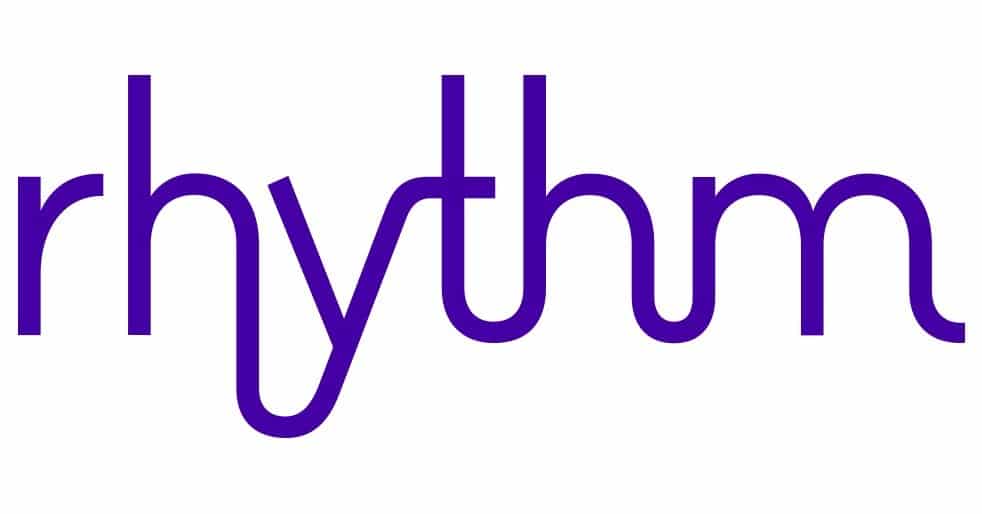
Statewide Service
Average cost
Pros
- Low number of customer complaints
- Values transparency
- Up to $150 in bill credits to cover switching fee from old provider
- Charges contract cancellation fees
Cons
- Young company
- No prepaid, no-deposit or variable plans
One of the best things about Rhythm, in our opinion, is that they only offer 100% renewable energy plans, and all of them come with reasonable prices per kWh. This helps customers save while still doing their part to reduce the strain their electricity consumption would otherwise place on the environment. Rhythm also has a wide variety of plans, including those that use entirely wind energy, all solar energy, and plans optimized for EV owners.
There have been some customer complaints about billing issues, so you’ll have to watch your account closely to make sure your payments go through and you don’t get double charged. Additionally, some customers have complained about the customer service not being great.
| PLAN NAME |
CONTRACT LENGTH (MONTHS) |
AVG PLAN RATE (¢/KWH) |
| Simply Green Flex |
N/A |
14.2 |
| PowerShift EV 12 |
12 |
14.8 |
| PowerShift 12 |
12 |
15.2 |
| Digital Discount 12 |
12 |
15.3 |
| Simply Protect 24 |
24 |
15.4 |
| TX Breeze 12 |
12 |
15.5 |
| TX Shine 24 |
24 |
15.5 |
| Simply Secure 24 |
24 |
15.6 |
Facts and Figures: Rhythm
| EcoWatch Rating |
|---|
| Better Business Bureau (BBB) Rating |
| Average Cost ($-$$$$$) |
| Solar Services |
| 4 |
| B |
| $$$ |
| 100% Renewable Energy Plans, Fixed-Rate Plans |

CleanSky Energy

Regional Service
Average cost
Pros
- Wide variety of contract term options
- Low number of customer complaints
- Values transparency
- All plans use clean energy
Cons
- Charges contract cancellation fees
- No prepaid or no-deposit plans
- Expensive
As the company name suggests, CleanSky offers exclusively renewable energy plans, which we love to see. It has quite a few of them, as well, and you can even choose between which type of renewable energy you want to support. The company also has a savings program through which company representatives will negotiate your other utility bills, like WiFi, cable, home security, and more. This can ultimately help you save money every month.
On the other hand, CleanSky doesn’t seem to have the best customer service. There are quite a few complaints about delays and poor service, and the company has a 1-out-of-5 star rating from customers on the BBB.
| PLAN NAME |
CONTRACT LENGTH (MONTHS) |
AVG PLAN RATE (¢/KWH) |
| Embrace Green 12 |
12 |
14.7 |
| Embrace Green 24 |
24 |
14.7 |
| Affordable Wind 12 |
12 |
15.0 |
| Ultra Clean Solar 24 |
24 |
15.1 |
| Free Month 12 |
12 |
15.6 |
| Breathe Easy 24 |
24 |
16.6 |
Facts and Figures: CleanSky Energy
| EcoWatch Rating |
|---|
| Better Business Bureau (BBB) Rating |
| Average Cost ($-$$$$$) |
| Solar Services |
| 4.5 |
| Not Rated |
| $$$$ |
| 100% Renewable Energy Plans, Fixed-Rate Plans, Business Energy Plans |
EcoWatch Methodology on Energy Providers in Houston
At Ecowatch we take a sustainable approach to our best lists. We selected the best energy providers in Houston by examining a variety of different components of the energy providers business. We considered their renewable options or green plans as the most weighted component of our scoring. We looked at how many different types of plans were available, how many years of experience the companies had, what terms and contracts looked like at each company. Lastly, we took a look at the providers track record when it came to delivering the service and customer service. We examined BBB ratings, looked into B Corp certifications, and found out if they offered competitive and fair pricing. All of these factors helped us decide which companies to recommend and which superlative to award!
FAQ: Houston Energy Plans
At EcoWatch, we frequently receive energy-related questions from readers in Houston. Here are the most common questions we see, along with our answers:
Based on our market research, Gexa Energy offers the cheapest electricity rates through its Gexa Eco Choice 3 plan (rates at 8.9 cents per kWh with a 3-month fixed-rate contract). In most cases, 100% renewable energy plans are a touch more expensive than others. Surprisingly, Gexa’s Eco Choice 3 plan is not only the most affordable in Houston, but it also uses 100% renewable energy.
We’ve found that the best energy providers in Houston include Constellation Energy, Gexa Energy and Green Mountain Energy. However, the provider that’s best for you will depend on your household’s specific energy needs.
Because of deregulation, the best way to lower your electricity bill in Houston is to compare rates from multiple providers and choose the one that’s going to offer you the best deal over time.
You can also work to lower your overall electricity use by making more conscious decisions to turn off lights, better insulate your home or make energy-efficient home upgrades. Follow these tips for more ways to save energy at home.
It’s hard to say which of Houston’s energy plans is best, because what’s best for one customer may not be the best for another. We recommend looking at our top three best companies — Constellation, Gexa and Green Mountain Energy — and exploring their rate options to find the best electricity plan for your household. Or, use this link to get connected to the best energy providers in your area.

 233k
233k  41k
41k  Subscribe
Subscribe 
